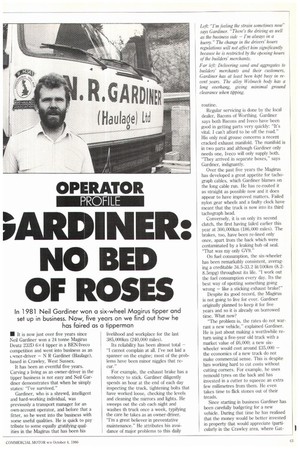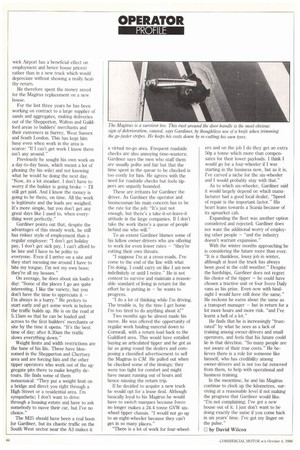;ARDINER:
Page 45

Page 46

If you've noticed an error in this article please click here to report it so we can fix it.
N• BED
OF ROSES
In 1 981 Neil Gardiner won a six-wheel Magirus tipper and set up in business. Now, five years on we find out how he has faired as a tipperman IN It is now just over five years since Neil Gardiner won a 24 tonne Magirus Deutz 232D 6x4 tipper in a BEN/Iveco competition and went into business as an owner-driver — N R Gardiner (Haulage), based in Crawley, West Sussex.
It has been an eventful five years. Carving a living as an owner-driver in the tipper business is not easy and Neil Gardiner demonstrates that when he simply states: "I've survived."
Gardiner, who is a shrewd, intelligent and hard-working individual, was previously a transport manager for an own-account operator, and before that a fitter, so he went into the business with some useful qualities. He is quick to pay tribute to some equally gratifying qualities in the Magirus that has been his livelihood and workplace for the last 385,000km (240,000 miles).
Its reliability has been almost total — "I cannot complain at all. I've not laid a spanner on the engine; most of the problems have been minor niggles that re
.11
For example, the exhaust brake has a tendency to stick. Gardiner diligently spends an hour at the end of each day inspecting the truck, tightening bolts that have worked loose, checking the levels and cleaning the mirrors and lights. He sweeps out the cab each night and washes th truck once a week, typifying the care he takes as an owner-driver. "I'm a great believer in preventative maintenance." He attributes his avoidance of major problems to this daily routine.
Regular servicing is done by the local dealer, Bacons of Worthing. Gardiner says both Bacons and lveco have been good in getting parts very quickly: "It's vital. I can't afford to be off the road." His only real grouse concerns a recent cracked exhaust manifold. The manifold is in two parts and although Gardiner only needs one, Iveco will only supply both. "They arrived in separate boxes," says Gardiner, indignantly.
Over the past five years the Magirus has developed a great appetite for tachograph cables, which Gardiner blames on the long cable run. He has re-routed it as straight as possible now and it does appear to have improved matters. Failed nylon gear wheels and a faulty clock have meant that the truck is now into its third tachograph head.
Conversely, it is on only its second clutch, the first having failed earlier this year at 300,000lun (186,000 miles). The brakes, too, have been re-lined only once, apart from the back which were contaminated by a leaking hub oil seal. "That was my only GV9."
On fuel consumption, the six-wheeler has been remarkably consistent, averaging a creditable 34.5-33.2 liV100km (8.28.5mpg) throughout its life. "I work out the fuel consumption every day. Its the best way of spotting something going wrong — like a sticking exhaust brake!"
Despite its good record, the Magirus is not going to live for ever. Gardiner originally planned to keep it for five years and so it is already on borrowed time. What now?
"The problem is, the rates do not warrant a new vehicle," explained Gardiner. He is just about making a worthwhile return using a five-year old truck with a market value of £6,000; a new sixwheeler would cost around £35,000 — the economics of a new truck do not make commercial sense. This is despite him working hard to cut costs without cutting corners. For example, he uses remould tyres on the back and has invested in a cutter to squeeze an extra few millimetres from them. He even takes time to flick stones out of their treads.
Since starting in business Gardiner has been carefully budgeting for a new vehicle. During that time he has realised that the money would be better invested in property that would appreciate (particularly in the Crawley area, where Gat wick Airport has a beneficial effect on employment and hence house prices) rather than in a new truck which would depreciate without showing a really healthy return.
He therefore spent the money saved for the Magirus replacement on a new house.
For the last three years he has been working on contract to a large supplier of sands and aggregates, making deliveries out of the Shepperton, Walton and Guildford areas to builders' merchants and their customers in Surrey, West Sussex and South London. This has kept him busy even when work in the area is scarce: "If I can't get work I know there isn't any around."
Previously he sought his own work on a day-to-day basis, which meant a lot of phoning (by his wife) and not knowing what he would be doing the next day. "Now, its a lot steadier. I don't have to worry if the builder is going broke — still get paid. And I know the money is going to be there, on time. All the work is legitimate and the loads are weighed. It's more simple, but you don't get any great days like I used to, when everything went perfectly."
Gardiner points out that, despite the advantages of this steady work, he still has riskier style of employment than a regular employee: "I don't get holiday pay, I don't get sick pay, I can't afford to be late and I have to be polite to everyone. Even if I arrive on a site and they start messing me around I have to bite my tongue. I'm not my own boss; they're all my bosses."
On average, he does about six loads a day: "Some of the places I go are quite interesting. I like the variety, but you don't have the time to appreciate it — I'm always in a hurry." He prefers to start early and get some work in before the traffic builds up. He is on the road at 5.15am so that he can be loaded and across to the first builders' merchants or site by the time it opens. "It's the best time of day; after 8.30am the traffic slows everything down."
Weight limits and width restrictions are the bane of his life. These have blossomed in the Shepperton and Chertsey area and are forcing him and the other tipper operators who work out of the aggregate pits there to make lengthy detours. He finds some of them nonsensical: "They put a weight limit on a bridge and direct you right through a High Street or a residential area. I'm sympathetic; I don't want to drive through a housing estate and have to ask somebody to move their car, but I've no choice."
The M25 should have been a real boon for Gardiner, but its chaotic traffic on the South West sector near the A3 makes it a virtual no-go area. Frequent roadside checks are also annoying time-wasters; Gardiner says the men who staff them are usually polite and fair but that the time spent in the queue to be checked is too costly for him. He agrees with the need for roadside checks but feels tippers are unjustly hounded.
These are irritants for Gardiner the driver. As Gardiner the operator and businessman his main concern has to be the rate for the job: "It's just not enough, but there's a take-it-or-leave-it attitude in the large companies. If I don't take the work there's a queue of people behind me who will."
To an extent Gardiner blames some of his fellow owner-drivers who are offering to work for even lower rates — "they're cutting their own throats.
"I suppose I'm at a cross-roads. I've come to the end of the line with what I'm doing. I could carry on like I am now indefinitely or until I retire." He is not content to survive and maintain a reasonable standard of living in return for the effort he is putting in — he wants to progress.
"I do a lot of thinking while I'm driving. The trouble is, by the time I get home I'm too tired to do anything about it!"
Two months ago he almost made his move. He was offered the opportunity of regular work hauling material down to Cornwall, with a return load back to the Guildford area. This would have entailed buying an articulated tipper and he got as far as going round the dealers and composing a classified advertisement to sell the Magirus in CM. He pulled out when he checked some of the timings; they were too tight for comfort and might have meant running out of hours and hence missing the return trip.
If he decided to acquire a new truck he would opt for a lease deal. Although basically loyal to his Magirus he would have to switch marques because lveco no longer makes a 24.4 tonne GVW sixwheel tipper chassis. "I would not go up to an eight-wheeler because they can't get in so many places."
"There is a lot of work for four-wheel
ers and on the job I do they get an extra 50p a tonne which more than compensates for their lower payloads. I think I would go for a four-wheeler if I was starting in the business now, but as it is, I've carved a niche for the six-wheeler and I would probably stay with that."
As to which six-wheeler, Gardiner said it would largely depend on which manufacturer had a good local dealer, "Speed of repair is the important factor." His heart leans towards a Scania because of its upmarket cab.
Expanding the fleet was another option considered and rejected. Gardiner does not want the additional worry of employing other people — "and the industry doesn't warrant expansion."
With the winter months approaching he is considering the future more than ever. "It is a thankless, lousy job in winter, although at least the truck has always been good in the cold weather." Despite the hardships, Gardiner does not regret his choice of the tipper — he could have chosen a tractive unit or four Iveco Daily vans as his prize. Even now with hindsight I would have still done the same." He reckons he earns about the same as a transport manager — but in return for a lot more hours and more risk. "and I've learnt a hell of a lot."
He finds that he is increasingly "frustrated" by what he sees as a lack of training among owner-drivers and small operators, and feels that his future could lie in that direction. "So many people are not aware of their true costs." He believes there is a role for someone like himself, who has credibility among owner-drivers and is not too far removed from them, to help with operational and business training.
In the meantime, he and his Magirus continue to clock up the kilometres, surviving at a reasonable level if not making the progress that Gardiner would like. "I'm not complaining; I've got a new house out of it. I just don't want to be doing exactly the same if you come back in six years' time. I've got my finger on the pulse."
0 by David Wilcox








































































































































